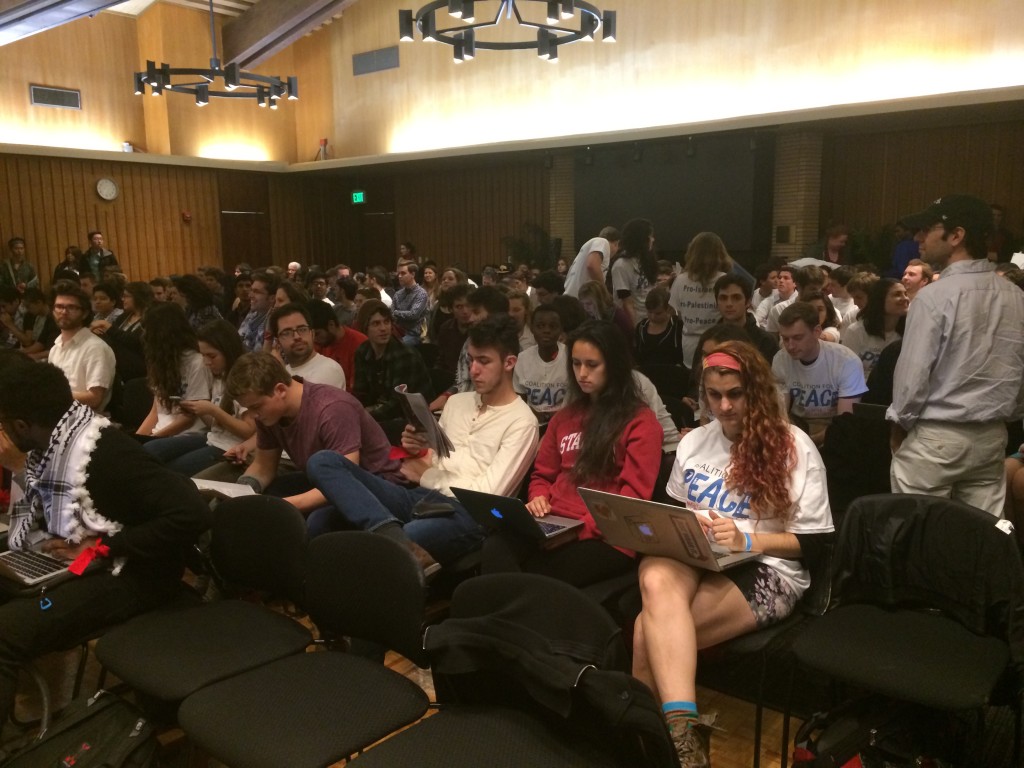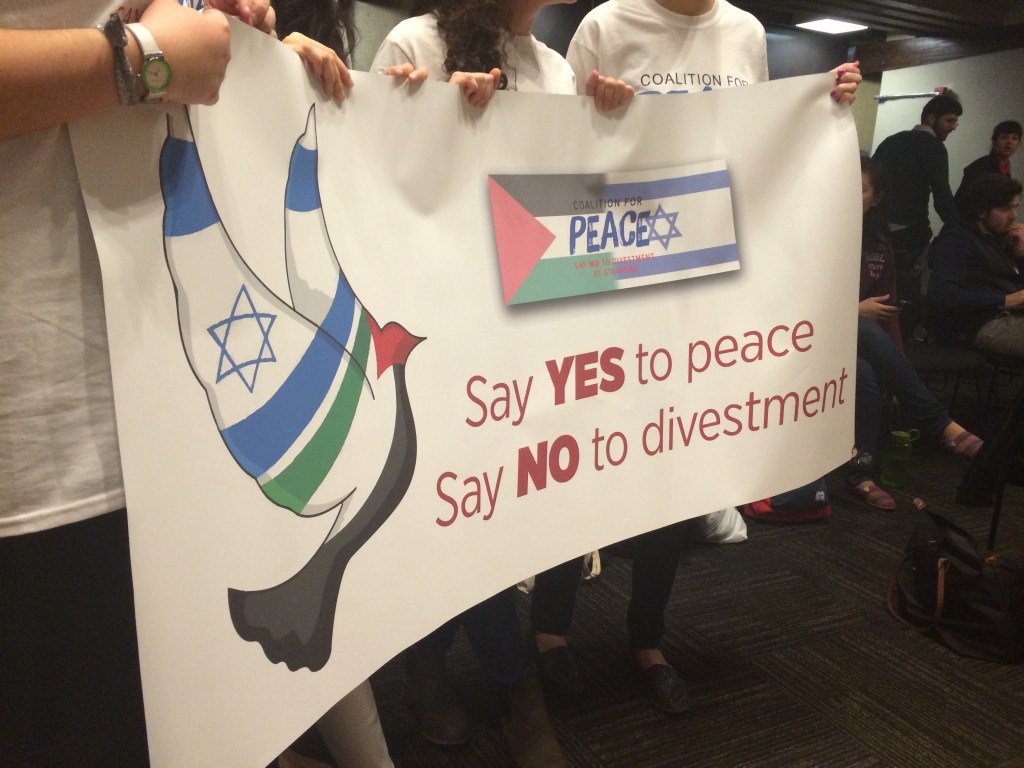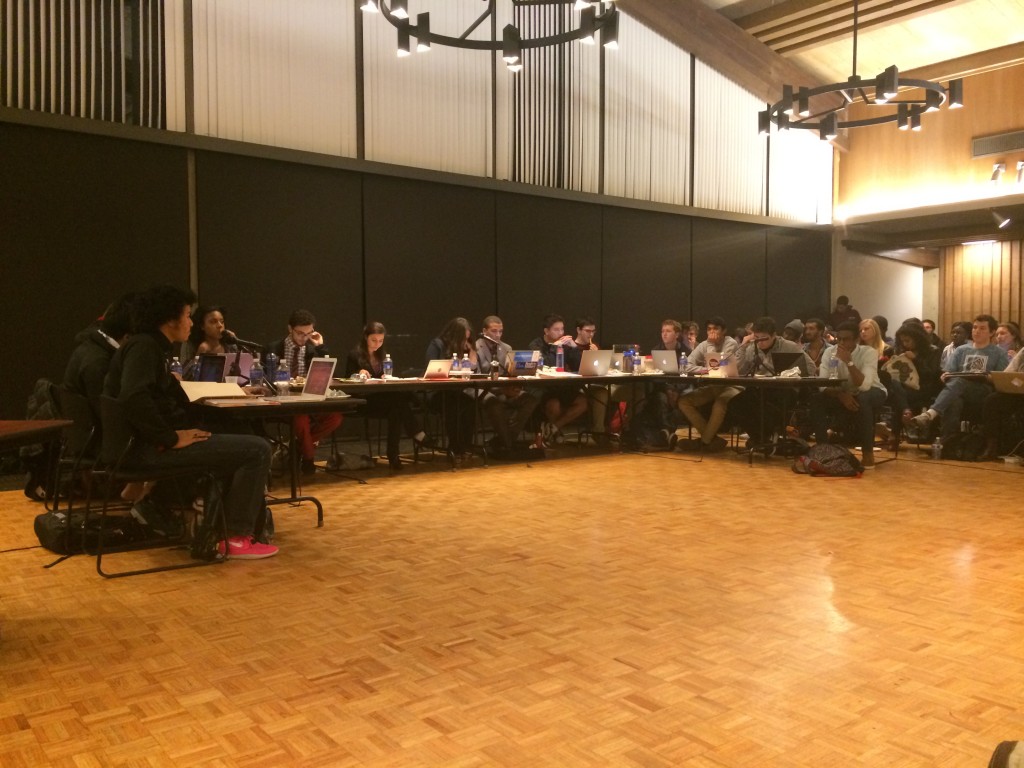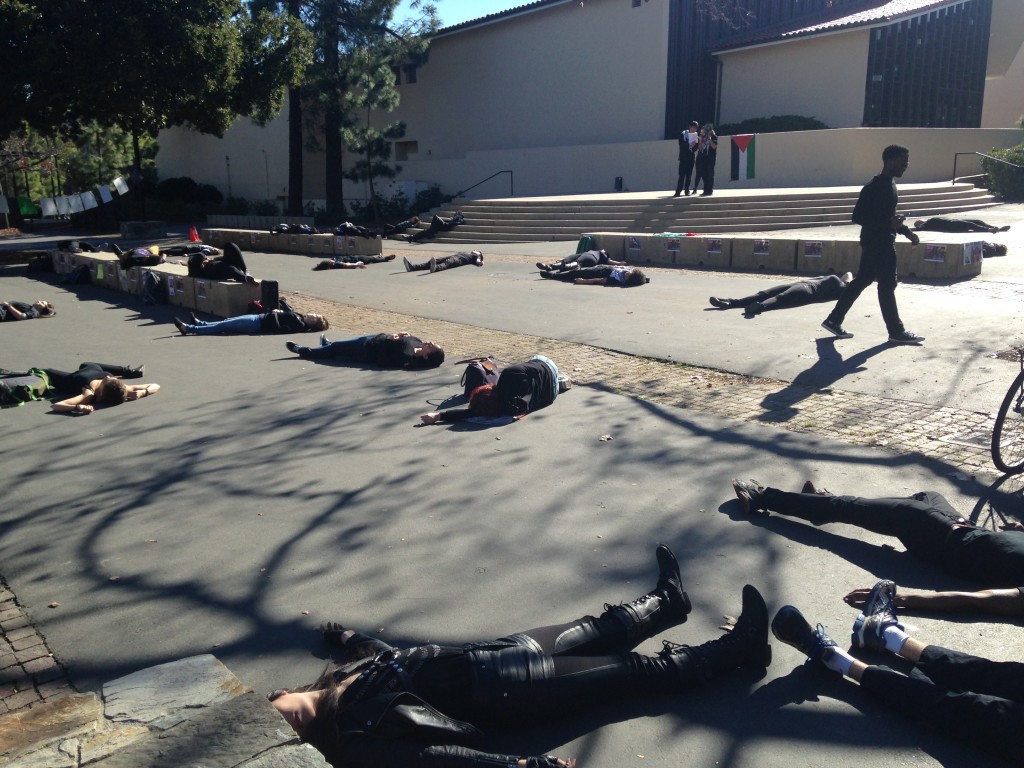One of the most prestigious universities in the United States recently fell victim to anti-Israel madness. How did it happen? And how can it be prevented on other campuses?
“Stanford ID?” said one of the two men stationed at the entrance to the hall.
I held out my student ID, feeling like I was breaking some rule even though I had every right to be there. Silently, they waved me in. I looked around, trying to decide where to sit. It was 6:30 PM on Tuesday, February 10, 2015; about halfway through my junior year at Stanford. It should have been a normal Tuesday. I should have been working on my paper, which was due the next day, or my presentation, or fuelling my caffeine addiction. I probably would have been taking some stupid quiz on BuzzFeed to find out which member of One Direction I was going to marry.
Instead, I was here in this staid room at the student union, waiting to hear the fifteen members of the Stanford Undergraduate Senate discuss and then vote on whether Stanford should divest from Israel.
The hearing wasn’t supposed to start until 7:00, but I expected a big turnout and wanted to be sure I got a seat. I scanned the room for members of my organization, the Coalition for Peace (we bill ourselves as “Pro-Israel! Pro-Palestine! Pro-Peace!”). I saw dozens of people wearing keffiyehs, the checkered black-and-white scarfs popularized by Yasser Arafat and airplane hijacker Leila Khaled. I couldn’t find any of my fellow pro-Israel students. But everywhere I looked—keffiyehs.
Where the hell where they? I was starting to feel like an unpopular middle-schooler trying to find a seat in the cafeteria. Feeling self-conscious, I sat down in an aisle seat about halfway from the front of the room. I stared at my phone, avoiding eye contact, furiously texting some friends who were supposed to be coming, “Are you close???”
No answer.
By 6:40 a few pro-Israel students had finally arrived. I didn’t know them well, but we sat together nearer to the front, so it would seem like there were more of us there. The room felt hostile, so it was good not to be alone.
Another uncomfortable ten minutes passed.
Eventually friends arrived. They were students I knew from the Jewish community, as well as the leaders of the Stanford Israel Association and a rabbi from the campus Jewish organization Hillel.
Finally.

Students from the Stanford Coalition for Peace sit near the back of the hearing room during the Undergraduate Senate’s first debate on divestment. Photo: Miriam Pollock / The Tower
I realized later that this was one of several mistakes we made: We did not arrive early enough to get seats in the front of the audience, where the student senators could see us. In the end, there were only two pro-Israel students sitting in the first row. That looked bad. It implied that there were fewer of us, that we cared less, that we didn’t prioritize supporting Israel.
It is my hope that this article will help point out and explain such mistakes, so other pro-Israel students facing divestment votes on their campuses can learn from our experience, as well as help the professional pro-Israel community better understand how to assist college students who are fighting BDS in institutions of higher learning.
The hearing started fifteen minutes late. Around 400 Stanford students, faculty, and staff were in attendance. The atmosphere was tense. But the beginning of the meeting was anticlimactic. We gave a standing ovation to the moderator, Sally Dickson, who would be retiring soon. She told everyone to speak in a civil, respectful manner. “That’s the way we do it at Stanford,” she said. Then there was some routine Senate business to attend to.
Someone in the back of the room yelled, “We can’t hear you!”
The Senate Chair, Ana Ordoñez, responded, “It was just funding bills. Sorry, guys.”
Who cared about funding issues, after all?
In fact, students at Stanford tend not to care about the student senate in general. Voting for senate candidates is easy. You just go to a web page and click a few buttons. Yet only 55 percent of undergraduates voted in the elections for this year’s undergraduate senate. About 36 percent voted for John-Lancaster Finley, the candidate who received the largest number of votes. This means that, in effect, less than 20 percent of undergraduates voted for Finley, and he was the most popular candidate. Just 8.4 percent of Stanford students voted for Luka Fatuesi, who would later vote in favor of divestment. It is important for pro-Israel students to remember this: Simply because a candidate receives a large number of votes does not mean their politics are popular among the student body as a whole.
Most candidates are elected because they secure important endorsements from campus organizations. Around a dozen student groups endorse candidates for Senate each year, but only three really matter: SOCC (Students of Color Coalition), FLIP (First-Generation Low-Income Partnership), and JSA (Jewish Student Association). The endorsement process is opaque, but students do tend to trust that candidates they endorse will represent them and their political beliefs. The four candidates who received the most votes last year were endorsed by all three of the organizations listed above. Eleven of twelve candidates endorsed by SOCC were elected, as were all nine endorsed by FLIP, and seven of the eight endorsed by JSA.
SOCC endorsements carry the most weight. SOCC is comprised of the Asian American Students’ Association, the Black Student Union, Movimiento Estudiantil Chicano de Aztlán, the National Association for the Advancement of Colored People, the Stanford American Indian Organization, and the Muslim Student Awareness Network. (It is unclear why the Muslim Student Awareness Network is part of this coalition, since a Muslim need not be a person of color). Every student group in SOCC is also in SOOP, or Students Out of Occupied Palestine, the coalition responsible for bringing the divestment proposal to Stanford.
As a result of this, the senate was clearly stacked against us from the beginning. But the divestment proposal needed a two-thirds majority to pass. We had been talking to senators for months and thought we had a pretty good idea of how they would vote. Based on this, we felt that the divestment proposal would probably fail. As the hearing went on, however, it became clear that the final vote would be much closer than we thought.
This was another mistake we made: We were complacent, and perhaps a bit naive. We had believed that the student senators were not like “real” politicians, and would keep their word.
The hearing started with ten-minute speeches from the authors of the divestment bill and its opponents. After that, members of the student body spoke. The senate wanted to give every student a chance to share their opinion without having the meeting last until 5:00 AM, so they decided that the speakers would be chosen via a lottery system. Any student could sign up to speak and indicate which side they would take. Then 30 students, half in favor of and half opposed to the divestment resolution, would be randomly selected to speak for two minutes each.
Some of the speakers were excellent. Many were not. We are students, after all, not speechwriters and orators. It was my impression that the students’ speeches had a significant influence on the senators. Unfortunately, our side made another mistake: We failed to coordinate our speakers. We should have entered our best fifteen speakers in the lottery, ensuring that they would be given the podium. Lack of coordination among our speakers meant that weaker arguments were repeated throughout the hearing, while stronger arguments were not emphasized enough.
I believe we would have done much better had we received outside help. I, and many other students, had neither the time nor the expertise to craft compelling speeches. It would have been helpful for professional pro-Israel organizations to support us with coordinated talking points or even pre-written speeches. Professionals would have been more aware of which points would resonate with people undecided on the issue, and which would have a negligible or negative impact. Public relations staff at pro-Israel organizations could have helped lay the groundwork in advance.

Members of the Stanford Coalition for Peace hold a sign during the first divestment hearing. Photo: Miriam Pollock / The Tower
Unfortunately, our opponents were far more professional and coordinated in their tactics. This was especially true in regard to the wording of the resolution itself. For example, SOOP emphasized throughout the hearing that they were only calling for divestment from specific companies, rather than Israel as a whole. The text of the resolution encouraged “Stanford’s Board of Trustees to selectively divest from companies that violate international law and human rights in the Occupied Palestinian Territories” (emphasis added). The resolution, they could then claim, was unconnected to the larger BDS (Boycott, Divestment, and Sanctions) movement, and was not even anti-Israel. Thus SOOP succeeded in rhetorically distancing the proposal from the BDS movement and its uglier aspects.
In fact, SOOP, the Stanford divestment bill, and BDS were intimately connected. The Vice President of the Stanford branch of Students for Justice in Palestine wrote an article titled “Planning for BDS at Stanford.” The former co-president of the Stanford chapter of Students for Justice in Palestine spoke at a panel on “Mainstreaming BDS” and wrote numerous articles indicating his support for the movement. The founder of the BDS movement, Omar Barghouti, was quoted in emails advocating divestment that were sent to Stanford students.
Despite all of this evidence, SOOP’s tactics proved very effective. Coalition for Peace had prepared to spend significant time presenting arguments against BDS. But SOOP was able to delegitimize these arguments simply by saying that their bill was unrelated to the movement. The senators fell for it. Pro-Israel students facing future divestment campaigns should expect this tactic.

The Undergraduate Senate deliberates during the first divestment hearing. Photo: Miriam Pollock / The Tower
At the same time, the hearing struck many in the Coalition for Peace camp as biased. When a pro-Israel student started discussing BDS, for example, Sally Dickson—the moderator who received a standing ovation from us—told him to “talk about the bill.” Yet later on, a representative of Stanford Students for Queer Liberation talked about her involvement in queer activism, and a member of Fossil Free Stanford talked about how oil drilling had led him to support the Palestinians. But Dickson did not instruct these students to simply “talk about the bill.” Pro-Israel students pointed out that, if the divestment proposal passed, the BDS movement would claim success, and news outlets around the country would recognize the vote as pro-BDS. Senator Finley responded, “Stanford can control the media.” Keffiyeh-clad students laughed appreciatively. Finley then said that the debate was not about the “B” and the “S,” but only the “D.” Millennials often take “D” to stand for “dick,” and Finley’s sex joke got another uproarious laugh from the SOOP supporters. Dickson, who had called for mutual respect, did not scold Finley for his behavior.
During the final part of the meeting, the senators were supposed to discuss the resolution itself. But the proceedings promptly collapsed into farce. The senators were allowed to yield their speaking time to any student present. One senator brought a motion to disallow this practice, which led to a 15-minute debate. The crowd became restless and the motion was withdrawn. Then a senator proposed a motion to table the resolution until the general student body could vote on divestment. Debate over this motion, which was eventually rejected, took another ten minutes. Then a motion was passed to extend the debate on the resolution for another 20 minutes.
To relieve tension, the Senate Chair, Ana Ordoñez, called for a group breathing exercise. A pro-Israel student yelled, “Do you think this a joke?” and stormed out of the room. Ordoñez burst into tears. “I feel,” she said, “I feel like…”
“Like a Jewish student?” a member of the audience shouted out.
While these outbursts were cathartic, they were another mistake. Pro-Israel students should not shout out at divestment hearings, no matter how upset or angry they get. SOOP supporters would later use these outbursts to discredit Coalition for Peace’s assertion that we were in favor of peace.
After four hours, the Senate finally voted: Nine senators voted in favor, five against, and one—Ordoñez—abstained. With 64 percent of the vote, the divestment bill was defeated, but only barely.
After the vote, I was more emotionally drained than I thought possible. But at least we had won, or thought we had. Yet I spent the next week feeling more relieved than triumphant. The vote hardly seemed like a victory.
Then, a week later, a friend texted me, “Apparently there’s a revote on divestment.”
“WHAT?” I replied, in complete disbelief.
There was no official notice that the senate would be holding a revote on divestment. Apparently some of the senators claimed that they were overwhelmed by all the people present at the debate. After thinking it over, they decided they wanted to change their votes.
Senator Rachel Samuels—who had attended numerous Coalition for Peace meetings and promised to vote “no”—decided she wanted to abstain and initiated the revote. In an email to her fellow Senators, she said,
I made the wrong choice; my objection to divestment was not an objection to the bill itself; I was unprepared to process a bill that explicitly separated itself from the BDS movement. I had voted on an implicit bias that I never genuinely challenged. … I have been called selfish, and while it would be nice to get some sleep, know that my own tribulations are a result of the pain I have caused so many others.
Ordoñez also changed her vote, from an abstention to yes. None of the other senators changed their minds, so the final vote was ten in favor (John-Lancaster Finley, Victoria Kalumbi, Malcolm Lizzappi, Amartya Das, Mohamed Elmalik, Jackson Hart Beard, Kenneth Tea, Ana Ordoñez, Anthony Ghosn, and Luka Fatuesi); one abstention (Rachel Samuels); and four against (Ben Holston, Andrew Aude, David Wintermeyer, and Eric Theis). This time, divestment passed.
Pro-Israel students at Stanford mounted a hard-fought campaign against divestment, from talking to Senators to publishing op-eds to leading counter-protests. Unfortunately, this was not enough to defeat the divestment bill. Pro-Israel organizations and students elsewhere should learn from our mistakes. Here are several recommended strategies:
- 1. Show up early. Pro-Israel students need to show that they care and are not complacent about this issue.
- 2. Lobby student senators, but don’t take them at their word. They may be student politicians, but they are politicians all the same.
- 3. Coordinate speakers and speeches so as not to waste time on weak or unimportant points.
- 4. Prepare for proponents of a pro-divestment resolution to distance the proposal from the BDS movement itself.
- 5. Expect a somewhat farcical proceeding, but do not react emotionally.
- 6. Seek professional support for preparing talking points, speeches, and overall strategy.
The best way to defeat divestment, however, is to vote for pro-Israel students. Very few Stanford students tend to vote for student government, and it is likely the same at other schools. Aggressive campaigns—perhaps supported by professional pro-Israel organizations—to get out the vote in favor of anti-divestment candidates are an absolute necessity. Had we been able to get one or two more pro-Israel students on the senate, divestment would not have passed. Put simply, the best way to defeat the BDS movement on campus is to make sure it never has a chance in the first place.
![]()
Banner Photo: Peter Thoeny / flickr






